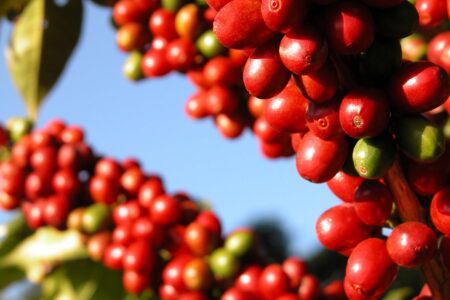Assessing 2023 beverage flavour & ingredient innovations

Image: Kerry
Floral, fruit, functional, botanical, low sugar, sustainable? In an exclusive for T&CTJ, Kerry’s John Kelly outlines this year’s beverage flavour and ingredients trends that coffee and tea marketers must be aware of to meet consumers latest predilections.
It’s a new era for tea and coffee. As exciting new flavour innovations continue to pop up in the marketplace, these time-honoured beverages are enjoying a renaissance of interest from consumers seeking innovative new tastes and product features. The question that comes up immediately for producers: Which flavour innovations will be the ones to excite existing and new customers alike, and foster repeat purchases? These days, amid a bewildering array of new botanical flavours, functional ingredients, plant proteins, sugar challenges and sustainability concerns – all of which must factor into development efforts – the profusion of product combinations and permutations is enough to leave even seasoned product creators with more questions than answers.
Flavours and ingredients provider, Kerry, follows global traditional and emerging flavours and functional ingredients as they attract rising public interest. Its latest research, detailed in the company’s Taste and Nutrition Charts reveals key flavour trends for tea and coffee beverage product developers to keep in mind for 2023.
Florals are favourites
Lavender’s future, for one, seems assured. This floral favourite holds growing global appeal as a gentle flavour that supports mental physical and emotional wellness. Dataessential projects lavender inclusion to rise by 108 percent on US restaurant and bar menus in the next four years. Lavender has all sorts of possibilities, augured by its ability to combine well with other tastes; white chocolate is one of many exciting examples. White chocolate lavender latte, anyone?
Chamomile, traditionally used in tea, is perceived as warm, uncomplicated and comforting. Its appeal is also driven by the health benefits it’s believed to deliver.
Among the choices is another floral favourite, hibiscus, an engaging botanical flavour in beverages, and growing in sweet yogurt, and guava, a rising tropical flavour for beverages and sweet snacks, yogurt and frozen desserts. Guava’s exciting profile is also thought to include immunity support and digestion benefits.
New flavours combined with familiar favourites
There are all kinds of interesting emerging flavours able to mix and match with traditional favourites. Aside from the entrancing lavender and white chocolate pairing noted above, Kerry’s 2023 Flavour Insights highlight matcha tea as an emerging choice in hot beverages. Rose, turmeric, horchata, crème brulée and cardamom… the list goes on. Pumpkin spice is also well established, as are blueberry, mango and mocha.
Mixing flavours judiciously to create appealing new beverages drives consumer interest. However, the winners in the market are the brands that are combining novel flavours such as the above with fan favourite flavours already loved by consumers to create a beverage that is both familiar and nostalgic but also exciting and new.
Sugar reduction
Sugar has overtaken fat, salt and calories as the key health concern for consumers in Europe when eating out-of-home. Some 87 percent of consumers want to reduce their sugar consumption or are aiming to use sugar in moderation (per Consumer First, 2018). Since 2015, there has been a 44 percent increase in reduced-sugar drinks launches according to Mintel (2018).
Sugar reduction is a key flavour influencer that must be implemented carefully. Why? Well, sugar delivers more in taste than just sweetness: It also builds in all-important texture and mouthfeel. Any sugar-reduction strategy must include ingredients to counteract any perceived loss in taste.
Adding functional ingredients
Today’s beverage producers have the option of adding in valuable functional ingredients, addressing the ever growing demand for health, especially in the area ProActive Health functional ingredients, which are designed to address the most common health needs of consumers, across areas such as gut health, cognitive heath and immunity. Ingredients like ashwagandha are gaining prominence in markets around the world for their support of sleep and stress management, which are key components of cognitive wellbeing, and ingredients that work well in beverages.
Sustainability is an important consumer concern
Consumers gain from a ‘feel good’ factor when they purchase sustainable products, and it is a state of mind that shows no signs of abating. In fact, 89 percent of global consumers now expect companies to invest in sustainability; this is up from 65 percent in 2018, per Innova Market Insights (2019). Kerry’s Consumer First study revealed that 83 percent of consumers would consider the environment when making a purchase. This is not just for at-home purchases either with 71 percent of European consumers saying that sustainability is now important to them when choosing where to eat and drink out-of-home. Quite simply, consumers want to do something for the environment and to fight global warming, so a strong focus on sustainable ingredients can be a key differentiator for in today’s ultra-competitive environment.
However, ‘sustainability’ refers to much more than just environmental concerns. Consumers today want to know the provenance of the beverage ingredients they consume and know they were procured in a responsible manner. They want the growers to be compensated properly and farming communities to be sustainable over the long-term. Beverage producers need to not only ensure they know the origins and full sustainability of their ingredients, but also work on communicating this to end-consumers through your marketing and menu as our research shows that 81 percent of consumers believe foodservice outlets should do more to communicate what they are doing to protect people, the planet and society.
These sustainability and new flavour questions are hard to answer on your own. Human intelligence and experience can play a vital role, and product developers can apply it to their advantage by including ingredient suppliers in early-stage planning discussions. Harnessing their expertise and brainpower for use by the formulation team is the type of targeted help that can lead to market success in a crowded field. Fortunately, as consumers become more discerning, the efforts expended to draw their attention hold potential to be richly rewarded.
- John Kelly is strategy director for beverage at Kerry. Kerry is a world leader in taste and nutrition for the food, beverage and pharmaceutical market, innovating with customers to create great tasting products with improved nutrition and functionality, while ensuring better impact for the planet. Kerry’s consumer insights, global RD&A team of 1,100+ food scientists and extensive global footprint enables the company to solve customers’ complex challenges with differentiated solutions. As a valued partner of customers, Kerry is driven to creating a world of sustainable nutrition and will reach over two billion consumers with sustainable nutrition solutions by 2030. For more information, visit.www.kerry.com.



